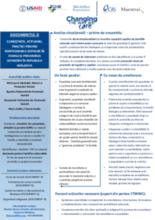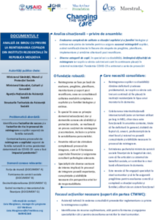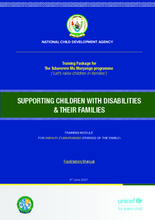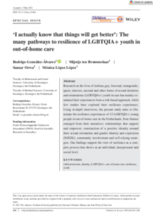Displaying 171 - 180 of 992
Studiul a evaluat cunoștințele, atitudinile și practicile populației generale în ceea ce privește reintegrarea copiilor în familii, integrarea copiilor cu dizabilități în școala și comunitate și prevenirea separării copiilor care trăiesc în familii vulnerabile.
A fost efectuată o analiză de birou a studiilor de reintegrare din Moldova și a orientărilor globale pentru a identifica succesul și factorii de risc în cadrul procesului, precum și lecțiile importante învățate.
This is a Training Module for the Inshuti z’Umuryango volunteer community-based cadre to support the implementation of the Tubarerere Mu Muryango (TMM) Programme (‘Let’s raise children in families’) led by the National Child Development Agency (NCD).
Using in-depth interviews, the present study aims to illuminate the resilience experiences of 13 LGBTQIA+ young people in out-of-home care in the Netherlands.
In Vancouver, Western Canada, 60 agencies and 20 youth from government care are working in partnership using a collective impact approach to address the systemic issues and barriers to healthy development that youth from care experience. This mixed-method evaluation included quantitative and qualitative data, collected through outcomes, diaries, surveys, and focus groups, to measure process and outcomes.
This paper argues that the Commonwealth Government should introduce a nationally consistent extended care system that would require all jurisdictions to provide a minimum standard of support until at least 21 years of age.
The purpose of this study was to present an illustrative test of whether an algorithmic decision aid could be used to identify youth at risk of exiting foster care without permanency.
The purpose of this critically appraised topic was to analyze the effectiveness of transitional programming for youth leaving the foster care system on increasing abilities of community integration.
This qualitative study addresses the question: In the context of transitioning from out-of-home care, what reflexive meanings do ‘avowedly’ self-reliant individuals attribute to current social support and social relationships?
This study aimed to better understand the role that Court-Appointed Special Advocates (CASAs) play in the lives of transition-age youth (TAY) by asking participants about the nature of their relationships with their CASAs, and the extent to which their CASAs helped prepare them for independent living.




